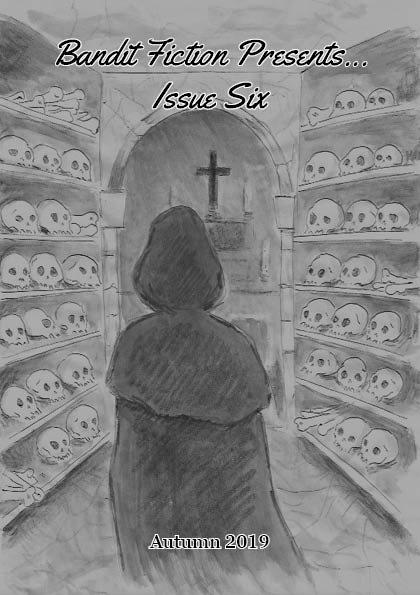
Somewhere, dear Reader, there exists an imaginary handbook on how writers must write their stories. The first chapter of this imaginary handbook dictates to writers how they can and cannot start their stories. There is a list of the ways in which one must not begin the plot under any circumstances. One of these rules mandates that the story must not open with its hero in bed.
Unfortunately, dear Reader, this is the story of Eric and the last day of the human race on Planet Earth, and Eric started his day in bed, asleep until his alarm promptly woke him at 6:45AM. This was the way Eric started every day, apart from one day two years earlier when Eric had fallen asleep on the sofa in the living room whilst attempting to watch 2001: A Space Odyssey for the third time. Eric wasn’t really a sci-fi fan and so never finished the film in any of these attempts despite Diane From Work’s claim that it was the best film she had ever seen. But then, Diane From Work had never seen Pretty Woman and never would, for today was to be humanity’s last and watching Pretty Woman was not on the agenda for Diane From Work.
I cannot help the fact that Eric started the day in bed. I am not God; I am only a writer. As a writer, I can choose which parts of Eric’s day to tell you, but I thought that beginning from the beginning was a sensible choice. And therefore, I chose to tell you that Eric began the day in bed.
There is another rule on the list that says a writer must not begin the story with the hero in a dream sequence, and thus I could choose not to tell you about Eric’s last dream on Planet Earth but I doubt it would make very little difference, given that Eric’s final dream on Earth consisted of a Spanish-speaking octopus sat in a bar, giving lifestyle advice. This dream had no relevance whatsoever to humanity’s final hour, but then again it had very little significance to anything whatsoever. I’m sure that if Eric had even remembered the dream when he woke up and gone to speak to a dream-interpreting specialised therapist, said therapist, having charged an exuberant fee for the service, would infer that Eric had a strong subconscious desire to leave behind his current life and move to become a scuba diver off the southern coast of Spain. This of course would be total rubbish. Eric had merely seen a mediocre amateur painting of an octopus in a local art gallery during his lunch break a week earlier when a couple talking in Spanish had walked past him and his subconscious merely happened to be processing this information in its own unique way during Eric’s final dream on Planet Earth. But, dear Reader, I digress.
Of course, the reality is, dear Reader, these rules do not truly apply to this story, for Eric is not in fact its hero. There was absolutely nothing even remotely heroic about Eric: he was as an accountant who lived in the inner-city and whose favourite colour was grey. It merely happens that the story of the final day of the human race is best told with Eric at its centre.
When Eric finally did get out of bed at 6:47AM remembering nothing of his octopus-filled dream, he felt entirely ordinary. He did not know that the entirety of the human race would perish later that day, nor did Julie from Edinburgh who had a passion for oil painting, nor did Alfonso who was on the run from a drug cartel in Mexico. In fact, the only person who did know was Isaac in Miami, but he had spent the last 10 years claiming that every day would be humanity’s last and had been sectioned many years previous for it.
Eric, feeling entirely ordinary, thanks to his ignorance of the world’s impending doom, put on his second favourite grey suit and reminded himself to buy more instant coffee granules on his way to work.
You may be wondering, dear Reader, why I chose to include such an obscure detail as Eric’s mini shopping list for that day. It is, I hope, to offer you a glimmer of hope in what would shortly be a very dark world indeed. For, you see, Eric was one of the very few human beings who made a shopping list on that day (which was to be their last) and then actually fulfilled the list’s objectives. I could of course have left you with the thought of a great number of tragedies, such as the diets that were to begin that coming Monday (a Monday that would never actually come) or the acne-ridden teenagers waiting just a few more days to tell another acne-ridden teen that maybe they might just like-like them, or, worst of all, poor Nicholas Felix from Toronto who had finally decided to divorce his wife and get down to writing that debut novel after 15 years of thinking about it. Had the world not ended and his plan come to fruition, dear Reader, he would have won the Nobel Prize for Literature, just for that book alone.
But instead I chose to tell you about Eric’s success in buying instant coffee granules from his local convenience store at 8:28AM to show you that the end of the world wasn’t all doom and gloom. There you go. Aren’t I a benevolent writer? You’re welcome, dear Reader, you’re welcome.
Eric’s day continued very much as ordinary as he himself felt. He attended his 9 o’clock meeting and fidgeted under the table all throughout it. It wasn’t a particularly unusual kind of fidget. Eric just sort of ran his right index finger around the palm of his left hand in a circle, over and over again. Nevertheless, it was a habit Eric had long intended to drop. Of course, Armageddon meant that he never would. (You probably aren’t thanking me for telling you that, dear Reader. I apologise, it probably is a little insensitive of me to draw your attention to it. Although, that said, it was partly your own fault, as you did choose to read those words. I didn’t make you, so you can stop looking at me like that, dear Reader.)
Eric spent the rest of his morning tapping away at his computer doing something that was probably accounting, although to tell you the truth, I’m not entirely sure what accounting consists of, although I’m sure Eric did. Whatever it was that Eric was tapping away at, it was for his 3 o’clock appointment with a client (obviously, dear Reader, you don’t need me to say that this meeting was at this point, post-apocalyptic and so didn’t take place, so I won’t).
Eric took his lunch break at 12 o’clock exactly, as according to his own watch, just like he did every other day of his working life. As he strolled out of the office, to what would be his last lunch break, he passed Diane From Work’s cubicle, but did not stop to greet her, as she was in mid-lecture to Susie From Work as to why Star Wars was infinitely better than Star Trek. Had Diane bothered to stop her babbling and actually allowed Susie From Work to voice what she had been thinking about for the last week, she might have heard some of the most sagely comments ever moulded by the lips of a person since the ancients themselves. But Diane From Work did not. And that was that.
Usually Eric’s lunch breaks lasted about an hour (or as close to one as a human being could actually approximate, the human mind not being one for precision), however on this particular day it was cut short, for obvious reasons, and lasted only 47 minutes and 3.62 seconds.
Now, as you imagine Eric sitting on a park bench eating his ham sandwich on white bread with no mayonnaise, I have a confession to make, dear Reader. I have broken yet another one of these rules laid down by the imaginary writer’s handbook. If I take it down from my wonderful Ikea bookshelf (one of the most splendid flatpack purchases I’ve ever made), there is a chapter all about narrative voice. The chapter clearly states that the writer must always strive for the narrative voice to be consistently reliable or it will allow the reader to question the text’s very integrity and could lead to endless cycle of plot holes that would, no doubt, subsequently lead to an existential crisis that would cripple the processing power of the Reader’s brain.
Let me be clear to you, dear Reader, I have lied to you only once in what I have chosen to tell you (perhaps it was in fact twice, but I can’t quite remember). It was right of me to say that Eric is not the hero of this story. However, his day in particular was not necessarily the best vehicle for narrating humanity’s demise, as I claimed. I could have chosen any number of humans and narrated their day, but instead I chose Eric’s. I’m not entirely sure as to why but I did, and that is all that truly matters.
And so, after an intern in Moscow’s Kremlin, on his first day, accidentally nudged the big red button with his elbow and thus set off a series of nuclear warheads embedded within the Earth’s crust all over the planet, the human race was blown to smithereens. Although, these details are incidental, I will have you know, dear Reader.
Humanity met its end at 12:47PM according to Eric’s watch. But Eric’s watch was a minute fast, not that he knew that, of course.
I apologise, dear Reader, if this was not the ending that you were eagerly expecting. I’m sure that if you were to write a rather stern letter to somebody sometime next week, then it might get read eventually. Maybe. Whatever you do, however, just don’t blame me.
Granted I might be the writer, but believe you me dear Reader, I didn’t write this story, I only wrote the words.
About The Author
Zac Copeland-Greene is a wannabee writer originally from Manchester, UK. When not trying to craft stories for his own amusement, Zac also studies Latin and Ancient Greek literature and will be soon reading Classics at Girton College at the University of Cambridge. I Did Not Write This Story is his first published work that has managed to escape from the drawer of relegated stories. As well as the stories and poems that make up this drawer, Zac is also working on his debut novel, Ophelia’s Puzzle, and a screenplay The Bachelor.
Bandit Fiction is an entirely not-for-profit organisation ran by passionate volunteers. We do our best to keep costs low, but we rely on the support of our readers and followers to be able to do what we do. The best way to support us is by purchasing one of our back issues. All issues are ‘pay what you want’, and all money goes directly towards paying operational costs.






















Leave a Reply